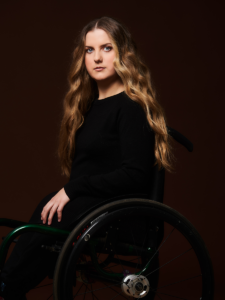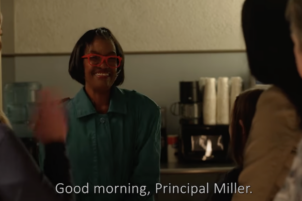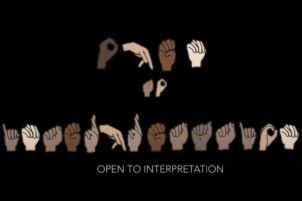Park City, Utah, Jan. 25 – The cutting reality that your life has been forever formed by a series of self-made choices hits deeply with most experiences of being human. But the real slap occurs when you foster space to explore the decisions that were made on behalf of you. Ella Glendining suspends this theme above the heads of her audience with the documentary Is There Anybody Out There?, which premiered at Sundance Film Festival on Sunday, January 22. In her feature doc, Glendining sets out to explore disability and the urgent desire to find a mirrored image among her fellow humans.
Glendining, born with no hip joints and short femurs, evaded surgical intervention during her childhood to change her image. Her condition is quite rare. However, through the course of her film, she interviews a group of disabled folks who share her diagnosis. As she guides the conversations, she poses the same quandary to them: should disabled people change their disability? Glendining seems to think not, at least – for her condition. At the emotional apex of the film, Glendining confesses her position to the mother of Charlie, a little boy with the same disability. “He’s perfect,” Glendining tearfully proclaims.
Surgery to alter this condition is a grueling process. Most surgeries are done during childhood. Dr. Paley, a surgeon specialist, and later apparent egoist, explains this reality to Glendining during a sit-down chat. She poses concerns about the consent of a child, and how the major life decision is made on their behalf. Dr. Paley cavalierly states, “I’ve done 25,000 surgeries” before expatiating about the role of surgeons to educate the parents and how the problem lies in their miseducation. His cold demeanor seems to be emblematic of the societal indifference to bodily autonomy for disabled individuals. Nonetheless, Glendining stays poised to receive his candor. After all, he only proves her point of concern about society’s understanding of disability – or lack thereof.
Nearing the end of the film, Glendining visits with her former pediatrician Dr. Tucker. After the cold interaction with a superstar surgeon, Dr. Tucker breathes life into the film. His kind face and gentle voice greets Glendining’s questions with grace. Glendining is curious about why she never received surgery as a child. Dr. Tucker kindly explains to her that there are a lot of factors to consider, including benefits versus risks. At the time, it’s implicated that her parents made the decision not to do the surgery because of the risks. In some sense, it’s a real vindication of Glendinings point. Why should disabled people change? The inverse: it’s a terrifying realization that much of a disabled person’s life is decided on their behalf.
Though much of the film weaves in and out of different disability themes, it’s really an excellent documentary to show how the lives of disabled people are decided on. “It’s about the soul,” Glendining said during an interview with RespectAbility’s Lauren Appelbaum ahead of the film’s premiere during the Sundance Film Festival. “It’s about what ableism can do to you!”









